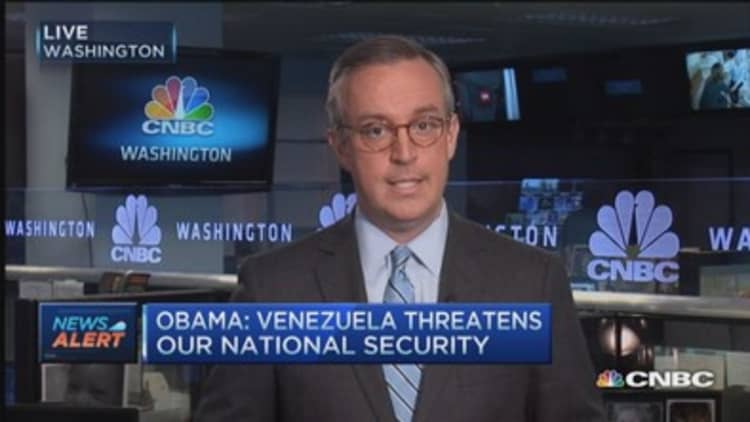
President Barack Obama has ordered sanctions against key figures in Venezuela, where supermarkets are to install fingerprint scanners at the tills to stop food hoarding and panic buying, in the latest signs that the hard-line socialist country is heading for economic ruin and further isolation from the West.
Obama declared a U.S. "nation emergency" on Monday with regards to Venezuela due to the "unusual and extraordinary threat" posed to security and foreign policy.
Seven Venezuelans were hit with sanctions blocking or freezing their interests in U.S. property, barring them from entering the U.S. and banning Americans from conducting business with them.
In an executive order, the White House said: "This new authority is aimed at persons involved in or responsible for the erosion of human rights guarantees, persecution of political opponents, curtailment of press freedoms, use of violence and human rights violations and abuses in response to anti-government protests, and arbitrary arrest and detention of anti-government protesters, as well as the significant public corruption by senior government officials in Venezuela."
Read MoreUS sanctions Venezuelan officials
Individuals hit by sanctions include Antonio Jose Benavides Torres, a former director of Venezuela's Bolivarian National Guard, a body accused of conducting serious human rights abuses as recently as last year.
Another is Manuel Eduardo Perez Urdaneta, director of the Bolivarian National Police, an entity accused of using severe physical force against peaceful protesters last year.
Fingerprint rationing
Two days' before the sanctioning, Venezuelan President Nicolas Maduro—successor to revolutionary leader Hugo Chavez—announced that thousands of fingerprint scanners would be installed in food providers across the country in a bid to ration food.
At the inauguration of a large supermarket on Saturday, Maduro said he had met with representatives from seven major supermarket chains, who had agreed "voluntarily" to install the scanners in their branches, and that these would be rolled out starting Monday.
"We will establish 20,000 fingerprint readers throughout the socialist system to guarantee the people their food. And also (there) has been a meeting today with the seven major private channels and all voluntarily join the establishment of the secure supply system," said the president in an announcement translated from Spanish on his website.
The announcement follows other recent policy moves by Maduro that have dashed hopes that a free-market element could be introduced to the economy.
The country had been showing signs of adopting a less controlled economy. Last month, the country's foreign exchange rate system was loosened to allow bolivars to be exchanged for U.S. dollars at a rate closer to the unofficial black market price.
"There is no sign whatsoever that the policy mix is changing, so things are just going to get worse," David Rees, emerging markets economist at Capital Economics, told CNBC on Monday.
"Venezuela is on the long road—or probably the short road—to disaster."
Regarding the fingerprint scanners, Rees said: "This is something that does not work."
World's most miserable economy?
Last month, Bloomberg rated Venezuela the world's most depressing economy in its annual "misery index," which is calculated combining a country's unemployment rate and consumer price index.
Inflation is seen remaining above 60 percent this year in Venezuela, after prices rose by a staggering 64.3 percent in 2014. The International Monetary Fund sees unemployment topping 10 percent in 2015.
As a major oil producer, the country has been hit hard by low energy prices, and is at risk of a defaulting on its sovereign debt.
Read MoreMoody's cuts Venezuela's debt rating
"There is a very strong chance they going to default later this year," Rees told CNBC. "There is a big hump in payments due around October/November; I think there are going to struggle to make those payments."
However, Latin American analysts at Barclays noted that despite the decline in oil prices, Venezuela's international reserves had increased this year.
"Although we expect the government to need to make use of its assets to cover its financing needs, the measures it has taken so far this year are containing the deterioration of liquidity," Alejandro Arreaza and Alejandro Grisanti said in a research note last week.
Read MoreHow much things cost in Venezuela now
Other than rationing, Venezuela has responded to its straits in what Rees called "classic Chavista" style by levying accusations that the U.S. and right-wing opponents in Venezuela were waging "economic war."
Maduro declared Saturday: "Venezuela is standing up to an economic boycott that has affected the proper distribution of food, one of the many facets of the economic war that the Venezuelan Right deployed in the country."
Several critics of the president have been imprisoned, including opposition leader and Caracas metropolitan mayor, Antonio Ledezma, who was arrested last month for his purported involvement in an alleged coup plot.
One of the individuals sanctioned by the U.S. on Monday was Katherine Nayarith Haringhton Padron, a senior prosecutor who charged Ledezma and others.
In a statement, the White House described Haringhton Padron's evidence as "based on implausible—and in some cases fabricated— information."


